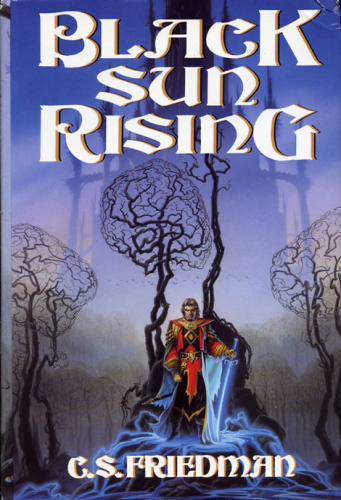 |
| ★★★★ |
Synopsis: On the planet Erna where natural forces inhibit technology and magic abounds, mortal enemies join forces in an attempt to defeat a common foe threatening the land. An intrinsic combination of Fantasy and Sci-fi in an epic Tolkien style secures this multi-layered adventure within in a niche market. This introduction to the trilogy is no ordinary good versus evil story however. The very heart of the novel lies in the philosophical contemplation of the morality of good and evil.
***
Review: I have to comment on the two main signature elements of this book, and the whole series, simply because they deserve a mention – to me they are the best aspects of the book.
Firstly, it is set on another planet (Erna) in our universe, which is technologically crippled by an natural energy field known as Fae. Fae is attracted to the cerebral workings of sentient minds manifests as ‘magic’ when used by trained minds, or as ‘Fae-born’ or ‘demons’ when responding to conscious or unconscious thoughts. Most often, fear and nightmares create these sentient creatures. Notably, the more complex the mind the more unstable the results of the manifesting fae, as there are more levels to respond to. This energy field directly affects evolution, use of technology and the lifestyle of civilizations so that people’s existence is entirely dependant on using it or working carefully around it. Overall its probably the most interesting approach to the existence of magic I’ve ever read anywhere, ever, period.
Secondly there are essentially two religious approaches to the fae. One is to essentially avoid it, and one is to use it for certain purposes. Intially, fae versus the deep-set religious inclinations of the human race lead to many demons manifesting as various gods. Eventually one man, the Prophet, laid down ground rules for a church that might use the fae positively in favour of the one true god, presumably that general God of our western world. Unfortunately that Prophet went a bit crazy and sold his soul. So the current state of affairs on Erna is that there are followers of this one-true-god scenario, one of whom is Damien Vryce, one main character. There are also many smaller pagan groups and various lesser gods roaming the lands (one pagan is another main character). Lets just say that another character, Gerald Tarrant, (the main anti-hero) throws a neat little spanner into the works here. (I can’t bear to openly spoil the book, its too great! Essentially however, he portrays the concept of gray area between good and evil which I discuss below.)
Now just a few more notes:
As I mentioned above: There is a lot of gray area in this book between conflicting views. Making a change from many books, the gray area is (although sometimes overtly presented) not just a concept you see within the book, but an element which draws you in to the point where you start saying, 'but what IS evil, and what IS good?' This is probably my favourite element as the contrast is portrayed in possibly the most endearing male ....interaction? I've ever encountered - Tarrant and Vryce. Its not a friendship by any means, the two men are inherently enemies, but the gray area that results in their comradary is superbly portrayed, as is the consideration of the resulting dilemma within Vryce. As I've said, Damien's thought process overtly displays the gray area in parts, but it can be forgiven. Character development and relations is certainly Friedman's area of expertise. This is turn leads to some particularly epic scenes between the two men. You can see them in your head quite clearly and the superb use of language means picturesque descriptions which are just screaming to be played out on a movie screen.
There doesn't seem to be a fixed plot, insofar as its not just a case of 'boy meets girl, girl gets hurt, boy seeks revenge' style writing. Theres a very definate sense of good or bad luck at various times and a genuine unfolding of a story in unexpected ways. In the end however all the loose ends tie neatly up into a complex yet complete weaving. Its so complete in fact the book could stand alone, even though it was initially devised as part of a trilogy.
I only have a couple of small issues:
1. The Rakh. A very interesting race insofar as their development, their contrast to their counterparts and the humans, but I don't think the exploration of their nature is deep enough. Perhaps this will reveal itself in a later book? I also think the use of 'cat-people' is a bit unoriginal.
2. Friedman is sex-mad. Everything in this book is 'sexual' apparently. Feeding on souls, fighting in battle, the thought of eating, its all apparently sexual. A friend made the comment, 'whats so abnormal in comparing ecstasy to sex?' well, its not abnormal, I just think she overdoes it a bit. I'm sure her husband is a very happy man though.
3. Minor point: There is some repetition throughout the book, mostly in Vryce's continous consideration of Tarrant's nature, though there are other examples. Notably, everybody thinks 'darkly' a lot. You'll see what I mean if you read it.
All in all though, superb. Go read it.
Rating: 4/5